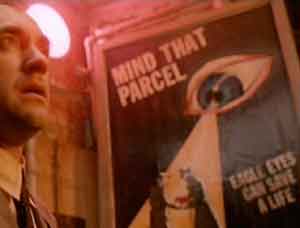In
Tyler Gilliam’s Brazil, he portrays
the future satirically in a classically Orwellian light. The movie follows Sam
Lowry after he is assigned to rectify a governmental error that led to the
detainment of a Mr. Buttle instead of a Mr. Tuttle. This leads him on an
adventure in which he tries to save the woman of his dreams, Jill, from being
locked away as a terrorist for attempting to further investigate the
disappearance of Buttle. In the opening scenes of the movie the discontinuity of Brazil from the real world is readily
apparent when a terrorist attack occurs right in front of Sam, yet hardly a
shred of notice is given to it or the wreckage it caused. Rather, the world of Brazil depicts a satirical portrayal of what
could happen if the masses yield too much power to the government and those who
are meant to protect us.
In the post
wreckage scene, a public service announcement is being issued from the Ministry
of Intelligence about the string of terrorist attacks plaguing them for the
past several years. The official stance of the government as far as the attacks
was simply a baseless affirmation to the people that the terrorists are simply
sore losers who “can’t stand to see the other guy win.” By completely devaluing
the magnitude of the attacks the government, although implementing massive
measures to “protect”, simply puts out meaningless slogans that are audibly
heard by the people.

A
scenario like that of Brazil could
only come about as a result of a people who have been completely subdued into
passivity and no longer question the decisions being made around them. The
passivity of the people is clear when the detainment of Mr. Buttle results in
no questioning to the initial officers or Sam from the wife or family, rather
it takes the angelic passer-by Jill to question the legitimacy of the arrest. Any
questioning of the motives or decision-making of the government is met with
immediate suspicion, which ultimately led to Jill’s bounty. In this way the
Ministry of Intelligence is like the ducts, always connected with the citizens
and subduing them to inaction (because the lack of action is not true inaction;
replacing the duct with a different colored duct exemplifies this idea) , yet never
allowing them any access in return. The
ducts served as a motif throughout the film to remind us of the constant
government intrusion taking place in Brazil,
subtly visible in the background of the homes and all other walks of life.


In this way, it serves as a
warning to not be led to passivity and inaction regardless of if it is in the
name of security. Although it is in issue that only came about after the movie,
Brazil reminded me of the ongoing
battle in modern times as to the role government should play in the corporate
world, especially in those such as utilities. The fear of some today about the
ever growing reach of government, literally, into our homes, whether through
internet safety or the current NSA fiasco, is echoed through the analogy of the
ducts. How much access we allow and how much access we are allowed in return
should not be taken for granted, as made evident in Brazil.
No comments:
Post a Comment